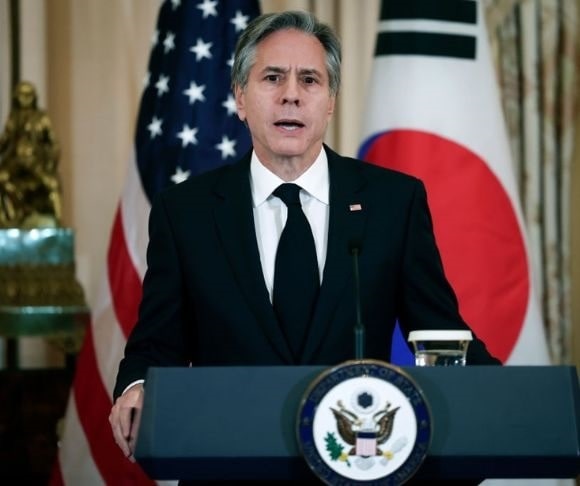Despite the hope-springs-eternal happy talk Foggy Bottom likes to affix to foreign diplomatic missions, Secretary of State Antony Blinken admitted prospects for significant progress in lowering tensions with the People’s Republic of China (PRC) – at the first meeting in five years between a high-level US official and President Xi Jinping – were set low. From early reports of the conversations, Blinken’s expectations were fulfilled.
“So, I think on – in terms of those objectives that we set for this trip – establishing open communications channels, directly raising issues of concern, exploring cooperation in places where it’s in our mutual interest to do so – we did all of that on this trip,” Blinken told reporters following his meetings. However, after the encounter with Xi, Blinken commented to the press that one of the critical issues on which the US foreign policy leader wanted to make progress went unrealized. As Associated Press diplomatic writer Matthew Lee reported:
“US Secretary of State Antony Blinken met on Monday [June 19] with Chinese President Xi Jinping and said they agreed to ‘stabilize’ badly deteriorated U.S.-China ties, but America’s top diplomat left Beijing with his biggest ask rebuffed: better communications between their militaries. After meeting Xi, Blinken said China is not ready to resume military-to-military contacts, something the US considers crucial to avoid miscalculation and conflict, particularly over Taiwan.”
Yet following the brief 35-minute meeting, both Blinken and Xi reportedly were satisfied with the “progress made during the two days of talks, without pointing to specific areas of agree[ment],” Lee explained. In the press availability session, Blinken provided an overview of the topics discussed in a thematic manner, cautioning that the talks took place in an atmosphere in which the relationship between the United States and the PRC must be managed “responsibly.” Blinken saluted China for playing a part in resolving Russia’s unprovoked invasion of Ukraine, asked that China encourage North Korea to “stop launching missiles,” and brought up the unfair, punitive treatment of US businesses in the PRC.
The Taiwan Issue
The US chief diplomat invoked the historical Taiwan Relations Act passed in April 1979 by President Jimmy Carter, establishing the “one-China” policy. He also referred to the Reagan-era Six Assurances to Taiwan, which, since 2017, have been affirmed “in law eight times, without specifying whether all or only some of the assurances should guide future US policy,” according to the Congressional Research Service. President Ronald Reagan assured a fearful Taipei government that the United States was not backing away from support. This underscores US foreign policy toward Taiwan today as defined in declassified cables conveyed to Taiwan’s President Chiang Ching-kuo on July 10, 1982:
- “We have not agreed to set a date certain for ending arms sales to Taiwan.
- “We have not agreed to prior consultation on arms sales to Taiwan.
- “We have not agreed to any mediation role for the US.
- “We have not agreed to revise the Taiwan Relations Act.
- “We have not agreed to take any position regarding sovereignty over Taiwan.
- “The PRC has at no time urged us to put pressure on Taiwan to negotiate with the PRC; however, we can assure you that we will never do so.”
Blinken told the press that the United States remains committed to “making sure Taiwan has the ability to defend itself.”
Two Sides to the China Story

Antony Blinken (Photo by Win McNamee/Getty Images)
It’s always instructive to observe how the other side saw the meetings. In a press release from the PRC’s Ministry of Foreign Affairs, the official statement from the Chinese Communist Party, Foreign Minister Qin Gang “pointed out that the China-U.S. relationship is at the lowest point since its establishment. This does not serve the fundamental interests of the two peoples or meet the shared expectations of the international community. China’s policy toward the US remains consistent and stable.” Left unsaid was: “and hostile.” By contrast, Blinken used words like “encourage” regarding China’s relationship with North Korea, whereas Qin “raised clear demands on the Taiwan question and other core interests and major concerns.” The United States encourages; China demands.
Additionally, a valuable understanding of how regional US friends viewed the meeting is available from their media. One takeaway from the Japanese news service described what it saw as a barometer for modest success. “Whether Blinken would gain an audience with Xi — the most powerful Chinese leader in decades — despite the increasingly acrimonious Sino-U.S. relationship had been widely seen as a barometer for the visit’s success,” Jesse Johnson, writing for The Japan Times, observed.
It may not matter if the US-PRC meetings were productive. The real question is, did the visit make a difference in easing tensions between the two nations? Since America’s top foreign policy emissary took just slightly more than half an hour of Xi’s time weighs heavily toward the symbolic nature of the proceedings.




